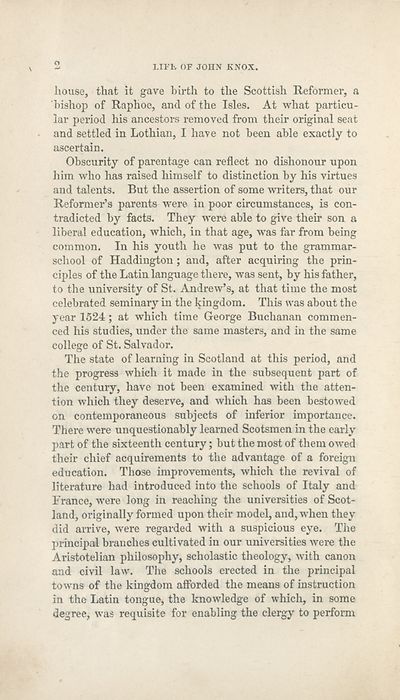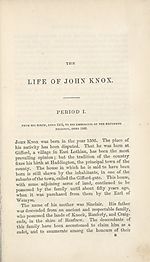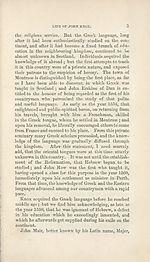Download files
Complete book:
Individual page:
Thumbnail gallery: Grid view | List view

JOHN KNOX.
house, that it gave birth to the Scottish Reformer, a
bishop of Raphoe, and of the Isles. At what particu¬
lar period his ancestors removed from their original seat
and settled in Lothian, I have not been able exactly to
ascertain.
Obscurity of parentage can reflect no dishonour upon
him who has raised himself to distinction by his virtues
and talents. But the assertion of some writers, that our
Reformer’s parents were in poor circumstances, is con¬
tradicted by facts. They were able to give their son a
liberal education, which, in that age, was far from being
common. In his youth he was put to the grammar-
school of Haddington; and, after acquiring the prin¬
ciples of the Latin language there, was sent, by his father,
to the university of St. Andrew’s, at that time the most
celebrated seminary in the kingdom. This was about the
year 1524; at which time George Buchanan commen¬
ced his studies, under the same masters, and in the same
college of St. Salvador.
The state of learning in Scotland at this period, and
the progress which it made in the subsequent part of
the century, have not been examined with the atten¬
tion which they deserve, and which has been bestowed
on contemporaneous subjects of inferior importance.
There were unquestionably learned Scotsmen in the early
part of the sixteenth century; but the most of them owed
their chief acquirements to the advantage of a foreign
education. Those improvements, which the revival of
literature had introduced into the schools of Italy and
France, were long in reaching the universities of Scot¬
land, originally formed upon their model, and, when they
did arrive, were regarded with a suspicious eye. The
principal branches cultivated in our universities were the
Aristotelian philosophy, scholastic theology, with canon
and civil law. The schools erected in the principal
towns of the kingdom afforded the means of instruction
in the Latin tongue, the knowledge of which, in some
degree, was requisite for enabling the clergy to perform
house, that it gave birth to the Scottish Reformer, a
bishop of Raphoe, and of the Isles. At what particu¬
lar period his ancestors removed from their original seat
and settled in Lothian, I have not been able exactly to
ascertain.
Obscurity of parentage can reflect no dishonour upon
him who has raised himself to distinction by his virtues
and talents. But the assertion of some writers, that our
Reformer’s parents were in poor circumstances, is con¬
tradicted by facts. They were able to give their son a
liberal education, which, in that age, was far from being
common. In his youth he was put to the grammar-
school of Haddington; and, after acquiring the prin¬
ciples of the Latin language there, was sent, by his father,
to the university of St. Andrew’s, at that time the most
celebrated seminary in the kingdom. This was about the
year 1524; at which time George Buchanan commen¬
ced his studies, under the same masters, and in the same
college of St. Salvador.
The state of learning in Scotland at this period, and
the progress which it made in the subsequent part of
the century, have not been examined with the atten¬
tion which they deserve, and which has been bestowed
on contemporaneous subjects of inferior importance.
There were unquestionably learned Scotsmen in the early
part of the sixteenth century; but the most of them owed
their chief acquirements to the advantage of a foreign
education. Those improvements, which the revival of
literature had introduced into the schools of Italy and
France, were long in reaching the universities of Scot¬
land, originally formed upon their model, and, when they
did arrive, were regarded with a suspicious eye. The
principal branches cultivated in our universities were the
Aristotelian philosophy, scholastic theology, with canon
and civil law. The schools erected in the principal
towns of the kingdom afforded the means of instruction
in the Latin tongue, the knowledge of which, in some
degree, was requisite for enabling the clergy to perform
Set display mode to:
![]() Universal Viewer |
Universal Viewer | ![]() Mirador |
Large image | Transcription
Mirador |
Large image | Transcription
| Antiquarian books of Scotland > Scotland/Scots > Life of John Knox ; and, The life of Alexander Henderson > (20) |
|---|
| Permanent URL | https://digital.nls.uk/131832544 |
|---|
| Description | Thousands of printed books from the Antiquarian Books of Scotland collection which dates from 1641 to the 1980s. The collection consists of 14,800 books which were published in Scotland or have a Scottish connection, e.g. through the author, printer or owner. Subjects covered include sport, education, diseases, adventure, occupations, Jacobites, politics and religion. Among the 29 languages represented are English, Gaelic, Italian, French, Russian and Swedish. |
|---|

